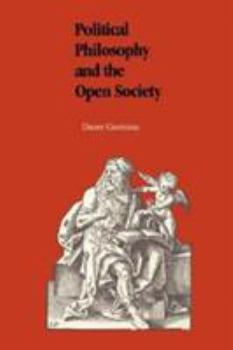Political Philosophy and the Open Society
Select Format
Select Condition 
Book Overview
Tracing the concept of the open society-one based on the idea of a universal community of mankind-from its origins to the present day, Dante Germino reveals in this study the central role of openness in forming man's perception of himself and his world and presents n important new political theory of the open society. Political Philosophy and the Open Society begins with the definition of openness in its various meanings and with a description of the idea of the open society. Believing that "an adequate theory of the open society must be grounded on the entire known history of mankind," Germino investigates the origins of the idea in myth, classical philosophy, Judeo-Christian revelation, and mysticism. He discusses the notion of the universal brotherhood of man as it appears in the works of classical Greek and Roman philosophers, including Plato, Aristotle, and the Stoics, and then shows how that idea was distorted by the concept of universal empire as expressed by Alexander and later by the Romans. This philosophical struggle continued as the early Christians, Sant Augustine in particular, attempted to reconcile the political reality of a secular world empire wit the spiritual reality of the universal kingdom of God, and it extended throughout the Middle Ages until the rise of the concept of the secular nation-state in the fifteenth century. Letting this historical background form the basis for his study, Germino works closely with the ideas of Henri Bergson and Eric Voeglin to advance his own theory of the open society. The first formulation of open society theory, Germino tells us, was by Bergson, whose The Two Sources of Morality and Religion defined a new morality of openness as epitomized in the Sermon on the Mount. And it is Voeglin, Germino asserts, who has done the most to reintroduce the reality of the spiritual dimension into contemporary discussion of politics and the ope n society. For Germino, Voeglin's distinction between "universality" and "ecumenism" must be at the core of any valid theory of the open society; and, in turn, a valid theory of the open society should be the centerpiece of any critical science of politics in our time. Concluding, then, that there must be an intimate connection between modern political philosophy and the concept of the open society, Germino calls for a far-reaching revision of the very idea of politics.
Format:Paperback
Language:English
ISBN:0807132616
ISBN13:9780807132616
Release Date:March 1999
Publisher:LSU Press
Length:208 Pages
Weight:0.69 lbs.
Dimensions:0.5" x 6.0" x 9.0"
Customer Reviews
1 rating
A classical reformulation of the idea of an open society
Published by Thriftbooks.com User , 24 years ago
Dante Germino makes an invaluable contribution to a sustainable notion of the open society, demonstrating connections as Raghavan Iyer did in Parapolitics and very few others have done, between contemporary sacred or even agnostic humanism and classical notions of politics. Dante Germino draws at once upon his close reading of Eric Voegelin's work in political philosophy and explores new ground in reconceiving the notion of an open society that is not historically idiosyncratic to the modern era as was Karl Popper's notion, but stated in terms of the human spirit that are universalizable to any human epoch. Strongly recommended as an intellectual resource for challenges likely to be with us throughout the 21st century.





